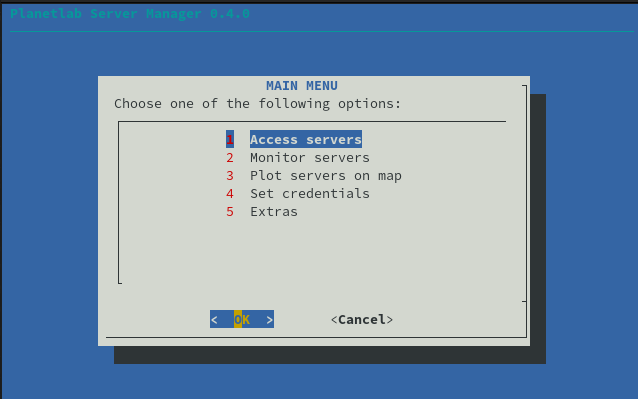Tool for monitoring PlanetLab network
Project description

Description
plbmng is a tool for monitoring servers within and outside of Planetlab network.
- For this purpose there are several tools within this project:
to get all servers from PlanetLab network and gather all available information about them
to create a map with pin pointed location of the servers
filter servers based on their availability, location, software, hardware.
to add server which are not from PlanetLab network into plbmng database
copy file/files to multiple server/servers from plbmng database
Dependencies
Python 3.5 or higher
Dialog engine(TUI)
- Python modules (all modules are available from pip):
geocoder
folium
numpy
vincent
pandas
paramiko
pythondialog
Installation
To install the plbmng module, type:
$ pip3 install plbmngInstall dialog-like engine. If you are using Fedora-like distributions:
$ sudo yum install -y dialogBasic usage
When you run plbmng for the first time, please add your credentials for Planetlab network. If you don’t want to add your credentials right away, you can skip it and add it in the settings later.
Once you have added your credentials, use Update server list now option in the Monitor servers menu. In default you will have old data which can be updated by this function. It downloads all servers from your slice and exports it as default.node file.
Main menu
Access servers: If you are looking for some specific node or set of nodes, use Access servers option. In the next screen you can choose from four options: access last server, search by DNS, IP or location. If you choose search by DNS or IP you will be prompted to type a string, which indicates the domain you are looking for. If you want to search by location, you will be asked to choose a continent and a country. Then you will see all available nodes from this selected country and you can choose one of them to see more detailes about this particular node. At the bottom of the information screen you can choose from three options.
- Monitor servers: Monitoring tools are there.
Update server list now, here you can update your list of servers.
Update server status now, here you can update your list of available servers.
- Plot servers on map:
Generate map, will create a map with all or specific nodes from planetlab.node file.
- Set credentials:
Will open interactive editor for you to insert your credentials to PlanetLab network.
Extras
In the extras menu you can find tool for managing your own server by adding them to the database. Another new feature added to extras menu is parallel copy to server/servers from database.
Add server to database: Allows user to add a server to the plbmng database. By adding info about server to the prepared file, you are able to filter and monitor your server with this tool just like with the others within PlanetLab network.
Copy files to server/servers: User is prompted to select file/files, server/servers from plbmng database and destination path on the target. DO NOT FORGET TO SET PATH TO SSH KEY AND SLICE NAME(user on the target) IN THE CONFIG FILE!
Project details
Release history Release notifications | RSS feed
Download files
Download the file for your platform. If you're not sure which to choose, learn more about installing packages.
Source Distribution
File details
Details for the file plbmng-0.4.2.post1.tar.gz.
File metadata
- Download URL: plbmng-0.4.2.post1.tar.gz
- Upload date:
- Size: 206.9 kB
- Tags: Source
- Uploaded using Trusted Publishing? No
- Uploaded via: twine/1.15.0 pkginfo/1.5.0.1 requests/2.22.0 setuptools/46.3.0 requests-toolbelt/0.9.1 tqdm/4.45.0 CPython/3.8.2
File hashes
| Algorithm | Hash digest | |
|---|---|---|
| SHA256 | 73a0d70cf6fd86fd40ff63f671fa5931c9458f916c7d98cf27f7131a1cea8540 |
|
| MD5 | 0e27280514be2f0d1e641e4e48efa4bc |
|
| BLAKE2b-256 | 6b9a66fd76b9f1ef8cab84dde254d3e1ff92cd4cf18002e3daeea481054db91c |














